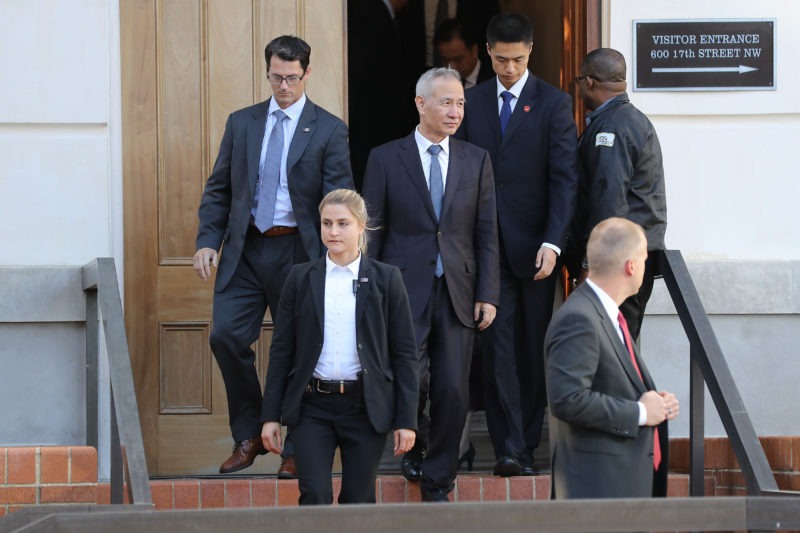US-China trade talks ‘productive’ as hopes mount for mini-deal
Chinese Vice Premier Liu He is leading Beijing’s delegatin to the talks (CHIP SOMODEVILLA)
Washington (AFP) – President Donald Trump on Friday said Chinese and American officials were working toward meaningful progress in trade talks, boosting hopes for a truce in the damaging tariff conflict.
As negotiators were wrapping up a second day of talks, Beijing and Washington appeared close to announcing an partial bargain, marking a positive turn after a summer of acrimony and escalation.
Trump spoke of “warmer feelings” in the talks and Treasury Secretary Steven Mnuchin told reporters discussions had been “productive.”
The good mood was a rapid improvement after a week in which the sides seemed headed for a dead end. Washington has blitzed China with aggressive maneuvers tied to ethnic persecution in Xinjiang and other matters.
And US tariffs on hundreds of billions of dollars in Chinese merchandise are due to rise on Tuesday.
But even an incremental win would be a boon for Trump, who faces an impeachment firestorm and a stinging criticism in Congress for his treatment of Kurdish allies in Syria, only the latest episodes of the White House’s perpetual turmoil.
A cheerful morning tweet from Trump fed a rally in stocks, with Wall Street erasing the week’s losses as investors bet an interim pact would include postponing next week’s scheduled tariff increases.
“Good things are happening at China Trade Talk Meeting. Warmer feelings than in recent past, more like the Old Days,” Trump said on Twitter shortly after officials resumed negotiations for a second day.
“All would like to see something significant happen!”
In a sign the two sides hope to make a positive announcement, Trump is due to meet with Beijing’s top trade envoy Liu He at 1845 GMT Friday.
Since the China trade war began last year, moments of comity and cheer have more than once been shattered, giving way to jolting deteriorations in relations between the two sides.
In the spring, officials said a deal was more or less at hand, only to have Washington resume tariff increases in May, accusing Beijing of reneging on core commitments already put down in writing.
China Foreign Ministry Spokesman Geng Shuang also told reporters in Beijing on Friday that China hoped “to promote positive progress” in the talks.
Media reports this week have sketched the contours of a partial deal that, while not addressing Trump’s biggest gripes about China’s trade practices, would offer something for both sides.
China will continue to increase purchases of US farm exports and pledge to refrain from currency manipulation while Washington will suspend tariff increases, Bloomberg reported.
Myron Brilliant, head of international affairs at the US Chamber of Commerce, told reporters on Thursday he had spoken with both sides and that an agreement on currency could emerge this week.
– Not just tariffs –
“I think that could lead to a decision by the US administration not to put forward a tariff rate hike on October 15,” he said.
The US Treasury in August branded China a currency manipulator, accusing Beijing of deliberately weakening the RMB to gain unfair trade advantages, making good on a Trump campaign pledge.
Where matters go from there remains to be seen, however.
China has so far balked at Trump’s demands for profound changes in the way Beijing manages its economy, which analysts say could politically undermine the Communist Party.
In an editorial on Friday, the party-owned China Daily said a partial deal “is a more feasible objective and one that would be in the common interests of both sides.”
Meanwhile, the Trump administration has continued to examine ways in which it could exert more pressure on Beijing beyond simply taxing Chinese imports.
Washington accuses China of attempting to dominate global industry through massive state intervention in markets, theft of intellectual property, hacking and subsidies, accusations shared by Europe and Japan.
Disclaimer: Validity of the above story is for 7 Days from original date of publishing. Source: AFP.


